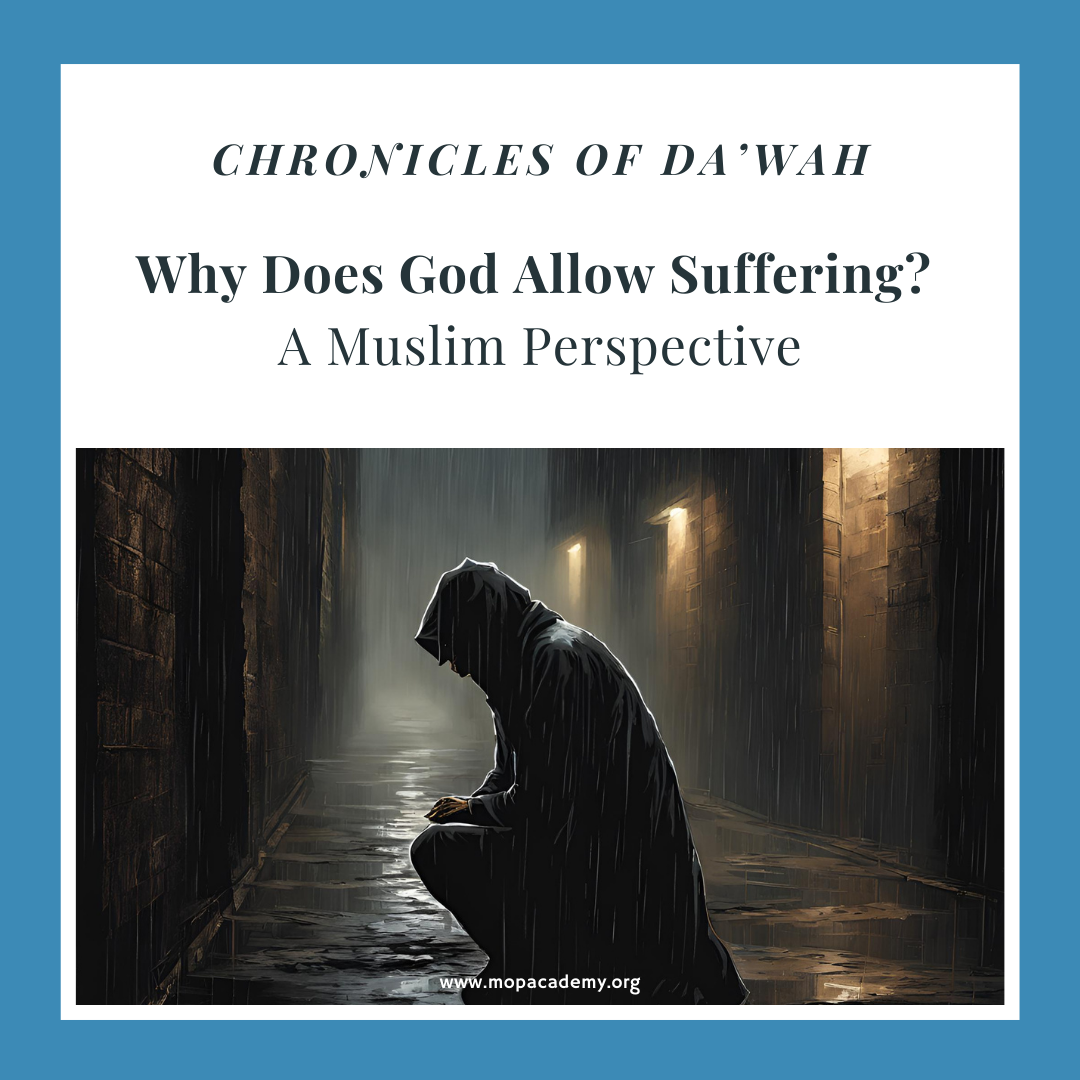
Blog entry by Sam Sam

A Muslim Perspective
One of the most common questions people ask when discussing faith is: “If God is All-Merciful and All-Powerful, why does He allow suffering?” As Muslims, we believe that everything happens with Allah’s wisdom and that suffering is not without purpose. This article explores the reasons behind suffering and how we can use this understanding when giving Da’wah (inviting others to Islam).
1. Life is a Test
The Qur’an makes it clear that life is a test. Allah has placed us in this world to determine who among us truly believes and who only follows faith when things are easy. Just like students are tested before they can progress, we, too, are tested in life.
“Do the people think that they will be left to say, ‘We believe’ without being tested?”
- [Qur’an 29:2]
Trials, whether small inconveniences or major hardships, reveal our level of faith and trust in Allah. Those who persevere through difficulties with patience (Sabr) and gratitude (Shukr) are rewarded in this life and the next.
2. Suffering Leads to Growth
Many of the greatest lessons in life come from struggle. Hardships strengthen our character, build resilience, and increase our dependence on Allah.
“Allah does not burden a soul beyond that it can bear…” - [Qur’an 2:286]
Pain and suffering push us to reflect, seek guidance, and grow spiritually. Just like exercise strengthens the body through resistance, difficulties strengthen the soul by teaching patience, gratitude, and humility.
3. A Reminder of the Afterlife
This world is not our permanent home. The presence of suffering reminds us that true justice and eternal peace exist only in the Hereafter. Many people who experience difficulties find themselves turning to Allah, realising that material comfort is temporary.
“With hardship comes ease.” - [Qur’an 94:5]
When we see suffering, we should remember that Allah’s ultimate justice will be served in the Hereafter, where no one will be wronged.
“Every soul will be compensated for what it earned, and they will not be wronged.”
- [Qur’an 2:281]
This is a powerful point to mention in Da'wah, as many people struggle with injustice in the world. Islam provides a clear answer: this world is a test, but the Hereafter is where true justice and reward exist.
4. A Means of Purification and Mercy
Suffering is not necessarily a punishment; in many cases, it is a means of purification. Just as gold is purified through fire, hardships purify our sins.
The Prophet said: “No fatigue, disease, sorrow, sadness, harm, or distress befalls a Muslim-even a thorn that pricks him-except that Allah expiates some of his sins because of it.”- [Bukhari, Muslim]
This perspective helps us see trials as a blessing in disguise, knowing that every pain we endure erases sins and elevates our status in the sight of Allah.
5. Free Will and Human Responsibility
Many forms of suffering - war, oppression, poverty - are direct results of human actions. Allah has given humans free will, and unfortunately, many people misuse it.
“Whoever does an atom’s weight of good will see it, and whoever does an atom’s weight of evil will see it.” - [Quran 99:7-8]
Islam teaches personal accountability. We are responsible for our actions, and while evil may appear unchecked in this world, ultimate justice belongs to Allah. This is why Islam strongly encourages standing against oppression and injustice.
6. A Call to Compassion and Action
Suffering isn’t just a test for those enduring it, it’s also a test for those witnessing it. Will we turn away, or will we help?
“The most beloved people to Allah are those who bring the most benefit to others.”
- Hadith, Tabarani
Islam encourages helping the needy, showing kindness, and standing for justice. Hardships allow us to practice empathy, generosity, and gratitude. Rather than seeing suffering as meaningless, we should use it as an opportunity to become better Muslims and serve humanity.
Final Thoughts: The Bigger Picture
Suffering is not without purpose. It is a test, a means of purification, a reminder of the Hereafter, and an opportunity for personal growth and service to others.
For those struggling with this question in Da'wah, it is important to highlight that:
• This world is a test, and suffering is part of that test.
• Hardships lead to spiritual growth and purification.
• True justice and reward exist in the Hereafter.
• Human freewill plays a role in much of the suffering we see.
• Suffering is a call to action, not despair.
By understanding this, we shift our perspective from “Why is this happening?” to “What can I learn from this, and how can I get closer to Allah?”
May Allah grant us patience and wisdom in the face of hardships and allow us to use this knowledge to guide others toward His light. Ameen.
Share this with someone who may benefit!